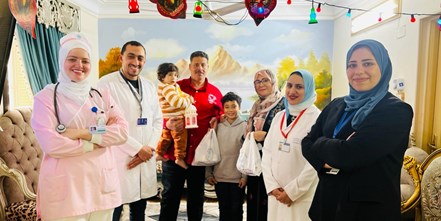



The Egypt Healthcare Authority announces the examination of 135,000 beneficiaries within the activities of the initiative "Ramadan Health for the Whole Family" since its launch in the provinces implementing the comprehensive health coverage system to date.
The head of the Egypt Healthcare Authority: Mobile clinics in remote and border areas and provinces, and 480 mobile medical teams from family medicine centers and units affiliated with the Authority roam the provinces implementing the comprehensive health insurance system to reach 100% of the initiative's targets.
The head of the Egypt Healthcare Authority: The initiative aims to conduct comprehensive medical examinations periodically to ensure the health and safety of citizens and guarantees early detection of diseases.
The head of the Egypt Healthcare Authority: The continuation of the initiative's activities until the end of the holy month of Ramadan. Operations rooms in each branch of the Authority in the provinces and a central operations room at the Authority's headquarters to monitor and evaluate the implementation of the initiative's activities.
The Egypt Healthcare Authority announced the examination of 135,000 beneficiaries in the provinces implementing the comprehensive health coverage system (Port Said, Luxor, Ismailia, South Sinai, Suez, Aswan) since the launch of the Authority's initiative "Ramadan Health for the Whole Family", which started at the beginning of the current Ramadan month and continues until the end of the holy month.
The Authority's statement explained that the "Ramadan Health for the Whole Family" initiative targets three main groups: hypertension patients, diabetes patients, and patients with both conditions, in all provinces implementing the comprehensive health insurance system. This is part of the Authority's focus on regular medical follow-up for those with chronic diseases, the elderly, people with disabilities, the underprivileged, and high-risk medical cases.
Dr. Ahmed El-Sobky, head of the Egypt Healthcare Authority and supervisor of the comprehensive health insurance and decent life projects at the Ministry of Health and Population, praised the efforts of all medical teams participating in the initiative, highlighting that the initiative relies on mobile clinics that cover all areas of the provinces implementing the comprehensive health insurance system. The initiative began in South Sinai and Suez and will move to Luxor and Aswan, in addition to 480 mobile medical teams from family medicine centers and units affiliated with the Authority in the provinces, trained to the highest level to examine cases and perform necessary medical procedures for beneficiaries. This ensures the broadest reach to beneficiaries, contributing to their health and safety.
The head of the Egypt Healthcare Authority noted that the initiative aims to conduct comprehensive medical examinations for users in the system, performed periodically to ensure citizens' safety and early disease detection. He confirmed the continuation of the initiative's activities until the end of Ramadan, mentioning that each branch of the healthcare authority in the comprehensive health insurance provinces (Port Said, Luxor, Ismailia, South Sinai, Aswan, Suez) has an operations room, in addition to a central crisis and emergency management room at the Authority's headquarters, to monitor and evaluate the execution of the "Ramadan Health for the Whole Family" initiative.
The "Ramadan Health for the Whole Family" initiative, launched by the Egypt Healthcare Authority for 2024, aims to target 300,000 citizens in the provinces implementing the comprehensive health insurance system. It seeks to promote health and prevent chronic diseases, providing optimal and free healthcare to individuals with chronic diseases throughout the holy month of Ramadan. The initiative includes seven additional free services, most notably home medical follow-up for chronic disease patients, activation of remote medical consultations with consultants and specialists, delivery of chronic medications to patients' homes, and educational campaigns for patients and their families on how to live with chronic diseases and the proper health guidelines to prevent their complications.